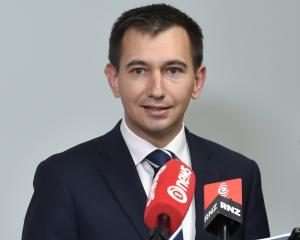
Christopher Luxon said music as well as arts should be deferred in favour of maths and writing. The comments drew the ire of Otago educators, musicians and students yesterday.
Taieri College music student Reef Tamihana, 18, said the school’s music programme had kept him in school.
"I don’t really find anything about school interesting any more, like I did when I was younger, but having music here is what has kept me around and made me want to do better."
Reef said he had found his calling in music and was working towards studying it at university.
Along with Valetta bandmates Chiara Crompton Bray, 17, Charlie Brough, 18, Robert Hannaford, 17, and Cameron Lord, 18, Reef had recently made it to the finals of the Smokefree Rockquest, which is being held next month in Auckland.
In a radio interview on Tuesday, Mr Luxon said he was happy for schools to defer arts and music to focus on achievement in math and reading.
"How on earth do you get a four-lane highway from Auckland to Whangarei with future generations that can’t do maths," he told Newstalk ZB.
Taieri head of music Brad Martin was "absolutely disgusted" by the comments.
He said if things went Mr Luxon’s way, only the wealthy would be able to afford to school their children in the arts.
"People who cannot afford private lessons are going to flounder, so you’re going to have the affluent kids, who can afford to do it, come in and be good at it whereas the poor kids won’t."

"If you’re just doing maths, you can’t see how to put that into the real world.
"Music is all maths; it’s all dividing beats and bars up, so it’s actually a real-life application of mathematics."
As a part of the college’s music course, students learnt about sound reinforcement, including sound waves, decibel patterns and noise reduction.
Mr Martin felt lucky that he worked in a school that supported the arts.
"It brings students in.
"At one of the open days, we had one parent say I can get science, maths and English at any school, but how good is your music department?"
Maniototo Area School principal Melissa Bell said she was "alarmed" that the government saw music and arts of less value than maths and reading.
She said schools did not need to do one or the other.
"In an era when social-emotional learning and creativity are more important than ever, our arts must be protected at all costs."
Arts played a key role in helping children to grow into creative, thoughtful and empathetic adults.
"We know how it impacts self esteem, relationships, mental health and communication.
"These attributes are so important for school leavers and can be developed alongside a robust literacy and numeracy programme."
New Zealand composer Ken Young said Mr Luxon’s comments were appalling and his secondary school music teacher Frank Dennis ignited his passion for classical music.
He went on to become the conductor for the New Zealand Symphony Orchestra.
"Everybody needs an opportunity to discover what they would like to do.
"It might not be art or music, but I think an education system should provide students with the opportunity to discover what it is that turns them on."












